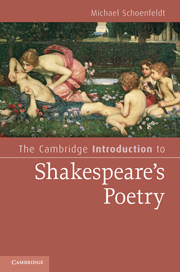Book contents
- Frontmatter
- Contents
- Acknowledgments
- Chapter 1 Shakespeare and English poetry
- Chapter 2 Shakespeare's banquet of sense
- Chapter 3 Constraint and complaint in Lucrece
- Chapter 4 Mysteries of the Sonnets
- Chapter 5 Time and mortality in the Sonnets
- Chapter 6 Friendship and love, darkness and lust
- Chapter 7 Solitary and mutual flames
- Chapter 8 Fantasies of Shakespearean authorship
- Notes
- Further reading
- Index
- Cambridge Introductions to Literature
Chapter 2 - Shakespeare's banquet of sense
Venus and Adonis
Published online by Cambridge University Press: 05 June 2012
- Frontmatter
- Contents
- Acknowledgments
- Chapter 1 Shakespeare and English poetry
- Chapter 2 Shakespeare's banquet of sense
- Chapter 3 Constraint and complaint in Lucrece
- Chapter 4 Mysteries of the Sonnets
- Chapter 5 Time and mortality in the Sonnets
- Chapter 6 Friendship and love, darkness and lust
- Chapter 7 Solitary and mutual flames
- Chapter 8 Fantasies of Shakespearean authorship
- Notes
- Further reading
- Index
- Cambridge Introductions to Literature
Summary
Sex isn't just friction and shallow fun. Sex is also the revenge on death.
– Philip Roth, The Dying AnimalAlways eager to please his audience, Shakespeare wrote a play called As You Like It. But before that he wrote a narrative poem as he thought they liked it, and he called it Venus and Adonis. He was a young, ambitious writer, hoping to compose a work that would garner both popular and aristocratic attention by pleasing a wide range of literary and erotic tastes. And he succeeded brilliantly. In the dedication, Shakespeare calls it “the first heir of my invention,” despite the fact he may have already written as many as seven plays. Clearly, he is announcing his ambition to do something even more significant, and imagining this poem as a crucial inauguration in the construction of a literary career. Indeed, the dedication also suggests that if the poem's patron will “seem but pleased,” the poet will honor his patron subsequently with “some graver labour.” As if this somewhat presumptuous dedication were not ambitious enough, the Latin epigraph – Vilia miretur vulgus: mihi flavus Apollo / Pocula Castalia plena minister aqua (“Let base-conceited wits admire vile things, / Fair Phoebus lead me to the Muses' springs”) – comes from a poem in which the Classical poet Ovid, whom Shakespeare is purposefully imitating, announces his own literary ambition.
Shakespeare was 29 years old when the poem was first printed in quarto in 1593.
- Type
- Chapter
- Information
- The Cambridge Introduction to Shakespeare's Poetry , pp. 19 - 37Publisher: Cambridge University PressPrint publication year: 2010



